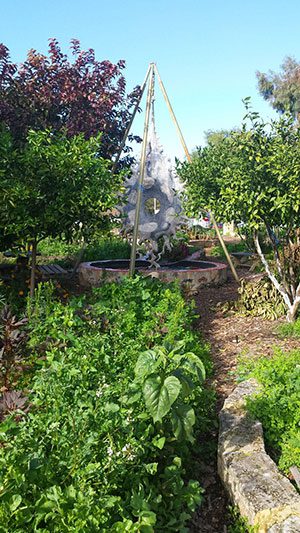Healing gardens at Perth City Farm
Story by Toni Salter, September 2015
Imagine being given a prescription for gardening by your doctor! It would seem absolutely reasonable to many of us who spend as much time as possible digging and planting and composting and watering. But to a group of researchers[1],[2], a prescription for daily gardening may be the key to wholeness.
Perth City Farm is certainly an example of how many different people can experience wholeness through spending time in the garden. The garden’s co-ordinator, Roseanne, addressed a group recently for the Australian Institute of Horticulture, highlighting the many uses for the community. The communal garden has welcomed many people recovering from mental health issues, people with physical disabilities, long term unemployed and others feeling displaced or isolated. Roseanne knows all too well the impact that growing flowers and vegetables has had on them, despite it being somewhat transient. People come and people go, but these gardeners are rewarded by the time that they spend at the city farm.
Transformation can happen through the help of a formal gardening program or simply being in the garden; whether you choose a passive or an active role in garden processes, the outcome is positive. Watering plants has been shown[3] to be one of the activities that is most protective against the onset of dementia, while simple 20-minute potting activities performed 3 times a week showed a significant increase in recovery for cancer patients[4]. Attention Restoration Theory (ART) asserts that people can concentrate better after spending time in nature, or even looking at scenes of nature.
The key to positive health outcomes is the connection that we have with our plants and natural surrounds, not just the goal of harvesting or producing. It’s the role that nurturing plays in altering our focus, the distractions that help us transfer our attention to a bird, a flower, a bee or insect rather than our problems, that become the important healing effect.
We can enhance that by including objects of a sensory nature to stimulate different parts of the brain to facilitate recovery. Sensory gardens can include contrasting colour and texture for visual impact, or using strong flower colours to stimulate and soft colours to sooth us. Peppermint Geranium is wonderful for it’s strong smell and furry leaves to touch.
Sitting in the garden just listening to the chirping of birds, the rustle of leaves and the laughter of children is beneficial. So try to include seating and sensory elements in your community garden to increase the wellbeing of all people visiting your garden, whether they are harvesting their produce or simply enjoying the ambience. By doing so, you may inadvertently help them to recover and enjoy improved wellbeing.
About the author…
Story by Toni Salter, registered horticulturist and President of Cultivate NSW, the Horticultural Therapy Society of NSW.
Also known as The Veggie Lady, Toni has a passion to make organic & productive gardens accessible to all people in the community, regardless of their age, race and ability. Toni was sponsored by Australian Institute of Horticulture to present a talk on Healing Gardens at Perth City Farm and at the combined conference for the Landscape Industry Association WA and Nursery & Garden Industry of WA.
If you would like to feature any accessible and inclusive programs in our newsletter, contact Toni for a story about your community garden.
Email: toni@theveggielady.com
Footnotes…
[1] Simons, et al (2006), Lifestyle Factors & Dementia, Dubbo NSW
[2] Cimprich (1992, 1993) USA
[3] Koura, S (2013), Effects of Horticultural Therapy Garden on Autonomic Nervous System Against Elderly Persons with Severe Dementia. Kyushu University of Health & Welfare, Japan.
[4] Meneghello, et al ( 2013), Garden Therapy in Neurorehabilitation Wellbeing and Skills Improvement, Agricultural Sciences Dept., Bologna University, Italy.


